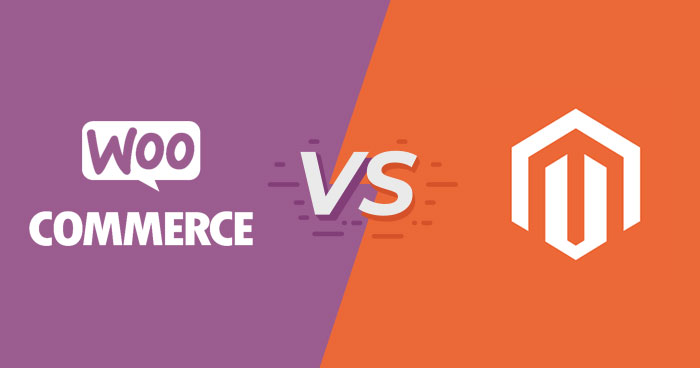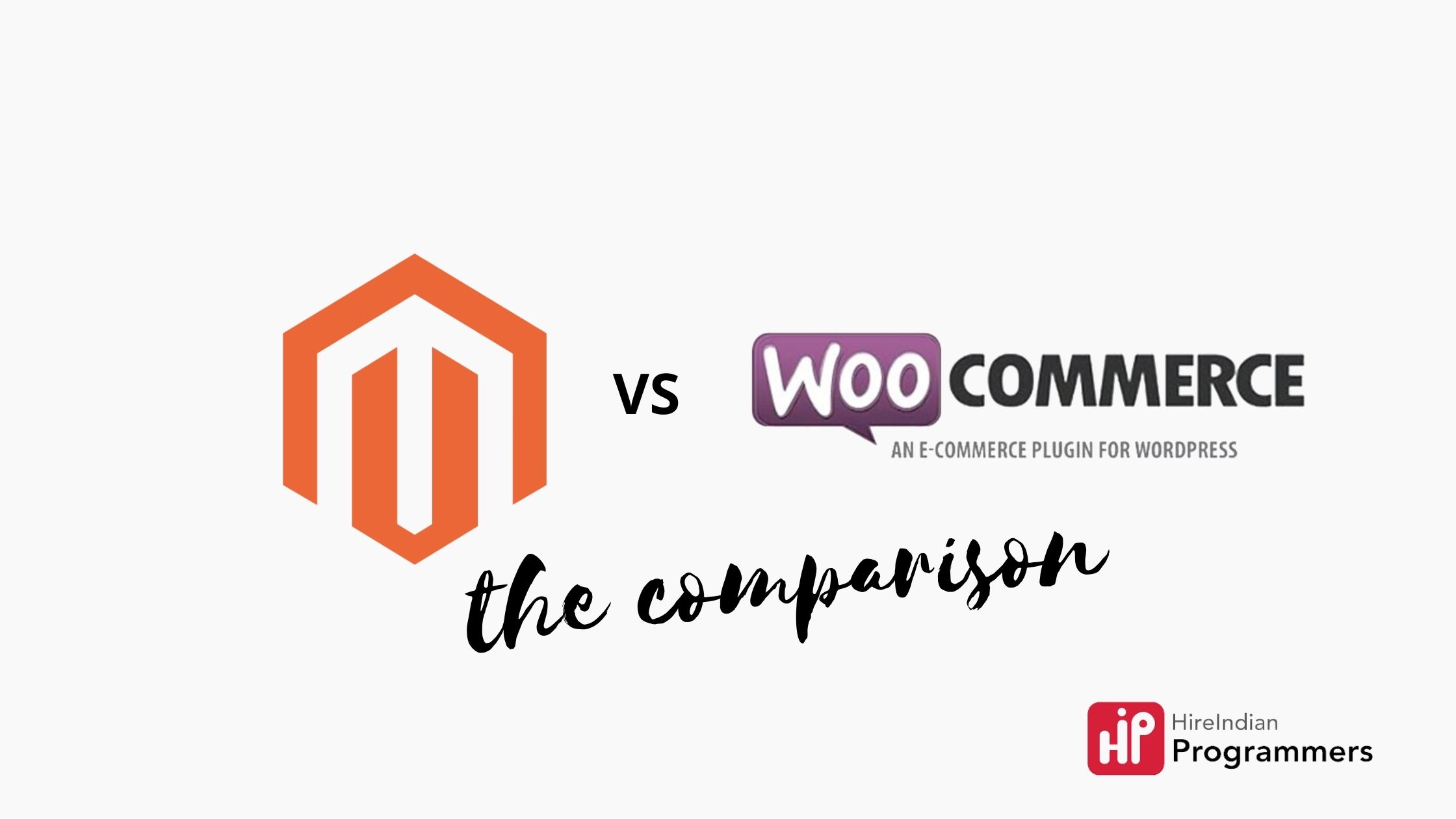Magento Vs WooCommerce; need to pick a clear winner? It is not that easy. With power-packed features in both these great website-making solutions, you always remain in a dilemma about the best one to pick. But in order to determine a winner for an eCommerce business owner, we need to think of these website builders on many different lines.
How can we choose the Best eCommerce Platform?
Magento and WooCommerce are arguably the leading open-source content management systems available for eCommerce. Among the two, Magento and WooCommerce, we cannot think of a win-and-lose situation. Both these platforms are incredibly well built and have a great performance.
However, the needs of every business are different. And, so are the considerations. We will talk about all these in detail later, but first, let’s understand the major considerations from a business perspective.
Human Resources: An eCommerce business owner needs to know about the talent available to him. Only if the developers of a certain technology are available to him in plenty, should he choose a particular platform to build his store on. This is in our opinion the most vital aspect to consider while choosing a platform. For example, does he know how to hire Magento developers, or are they available to him?
Capital Investments: It is not hidden from anyone that building a site on WordPress costs less than on Magento. This is especially because of the great number of coders who are experts in WordPress. But as they say, you get what you pay for. So, the amount of money you wish to invest is another factor to consider.
Customizations: The degree to which you wish to customize your eCommerce site is another big factor. Your choice of ‘how to make the customizations’ is important. Do you wish to use ‘plug and play’ plugins, or do you wish to custom code every detail of your website?
In-house development or Outsourcing: Do you have, or plan to have coders sitting in your office, or do you just wish that some else gets their hands dirty, and you as an eCommerce business owner only would want to demand the results.

Understanding the Equation: Magento Vs WooCommerce
To make a good decision, it is important that we understand both platforms impartially.
Understanding Magento
Magento is an Open-Source software that is owned by Adobe. The platform brags about its ability to offer extreme customizations. The platform also claims that their customers grow 3x faster than those using a competitor platform.
In an industry analysis done by Inchoo, it was found that 170,000 websites on the internet run on Magento. That is about 1.4% of the total websites on the internet. That’s not it, Adobe says that 150,000 innovators are in one way or the other working on the platform.
Understanding WooCommerce
WooCommerce is an additional plugin that can be added to any WordPress website to convert it into an eCommerce store, instantaneously. It works almost like magic for someone who doesn’t know about it.
WordPress is by far the most popular Content Management System on the market. Over 42% of websites use WordPress as their CMS. From hobby blogs to the biggest news sites online, WordPress powers multiple small and medium eCommerce websites across the globe.
Magento vs Woocommerce: Comparison
Both Magento and WooCommerce have their own dedicated supporters who support their cause and proclaim that the one they work on is the most effective. There are those who say:
- Magento for eCommerce is the best solution.
- WordPress for eCommerce is unmatched.
- WooCommerce for eCommerce is the go-to solution.
But we decided to cut through the bias and have a look ourselves, providing you with an objective opinion that will help you to make a decision.
-
Ease of Use:
For small businesses the ease to use a platform matters a lot. Imagine a homemaker deciding to sell some scented candles. How would she want her tech stack to be? Easy and friendly. For enterprises, it doesn’t just matter. They will onboard specialists to do the job, however hard it is.
| Nothing beats WordPress in its ease of use. The large community which works on this mammoth open-source software ensures that anyone can learn, get started, or troubleshoot it with ease. No wonder that the same flexibility is transferred to WooCommerce too. | Magento has been built for professionals and works best for medium to large organizations. It is fairly difficult for non-techies and the learning curve is steep. |
In this battle, we see WooCommerce as the clear winner. Only if that matters.
-
Use Case:
How easy is the platform to get started with? Again, it matters more to small businesses and not as much to larger organizations.
| WooCommerce is easy to get started, is affordable, and is highly scalable. Their website claims that you can process 100,000 orders on it every day. This makes it ideal for small and medium businesses that are just starting out. | Using Magento cannot be learned so quickly. Although scalable, it comes at quite a price. Resources that develop Magento to beyond a basic level are somewhat expensive and it is more poised towards giving its services to larger businesses. |
Here, we cannot talk about a winner. Both have their benefits and uses. While WooCommerce seems to be a platform that is ideal for smaller businesses, Magento is great for corporations.
-
Costs:
For enterprises, the cost game is a lot different from that of a small business. While an enterprise will think of the costs of developing and maintaining its own website, a small business will be more focused on the setup and maintenance of its eStore.
| WooCommerce is an open-source platform that anyone can download and install. It is true that premium extensions that enhance its features are typically costly and need annual memberships, but you can always use the basic functions for free.
In addition, your costs for web hosting will be contingent upon the scale of your business and the plans your service offers. |
Magento is a bit more geared toward businesses that obviously can invest more. So, it is costlier among the two. However, this doesn’t mean that small-scale businesses won’t benefit from its capabilities.
Magento provides both a no-cost Community Edition – which is sufficient by itself – as well as it also has an Enterprise Edition for large companies. |
You cannot say that one of them wins over the other. But WooCommerce is a cheaper platform to get started with. And once the business grows, it gives the opportunity to add more plugins, or directly work on its code to present a more robust eCommerce solution.
-
Speed and Performance:
Loading times are important in this era. Moreso when we talk about an eCommerce website. From all the factors, this is one of the greatest that helps an eCommerce business owner to get a sale.
| WordPress is known for its power to help in SEO. With loading times being an essential part of SEO, the situation remains unchanged. If a CDN is used, images are well optimized, WordPress can offer lightning-fast websites.
But remember, hosting plays a crucial part in this. All in all, it is easy to have an ultra-fast WooCommerce website. |
Magento is not far away from WooCommerce. If the developer and the Content Manager know how to do things right, this is a perfect website builder to have a fast website. Again, a lot depends on external factors like the CDN and the hosting. |
We can say that this can be called a tie. Either of the platforms can be fast or slow depending on the people working on them.
-
Extensions and Plugins:
Plugins enhance the functionality that is available on basic eCommerce websites. WooCommerce is different from Magento, yet both are popular for a wide number of extensions that can enhance the performance and appearance of the site.
| Based on WordPress, WooCommerce gives you access to more than 55,000 free WordPress themes and plugins. You can modify your eCommerce store to suit your needs in terms of products and management of stores, marketing, payment processing shipping, enhancements, and subscription. The best thing is that it is incredibly simple to integrate these into WooCommerce stores. | Magento Marketplace has nearly 6000 extensions that cover various aspects including accounting, marketing, finance, sales, payment and security, customization of content, and optimization of websites as well as for analytics and reporting and customer service. |
Although both the platforms offer extensions and plugins with similar functions, the sheer number of plugins available for WooCommerce is incredible. To make WooCommerce a clear winner over Magento, the number of free plugins on the side of WooCommerce is too huge to beat.
-
Level of Security:
Security has to be an important priority for any eCommerce business. In our opinion, the security of a website depends mainly on the ability of its developers and the precautions they undertake.
| WooCommerce remains quite secure as there aren’t any obvious security concerns in WordPress. The foundation of the system has made significant strides towards development, which means it’s extremely secure.
Problems could arise only if third parties are involved in the process of setting-up extensions. |
Magento gives customers of online stores great security. Website owners can always stay carefree as the platform provides security patches that are released regularly.
Additionally, a variety of security measures built into Magento are available to protect Magento installations and their management. In particular, these measures will help improve password management, enhance the security of clickjacking and cross-site scripting attacks, and also adopt more flexible ownership of the file system and permissions. |
Overall, both the two giants of the world of eCommerce Magento and WooCommerce have a good security threshold.
-
Marketing & SEO:
For an eCommerce business, there can be no bigger criteria than the ease to make a product through a particular platform. An eCommerce business is not just about looks and feel, it is majorly about the ease to take it to more and more people.
| WordPress is SEO-friendly right from the beginning. It will only get better after you select an SEO-friendly theme and begin using the amazing range of SEO plugins WordPress has to offer.
While Google might not be concerned about the CMS you decide to use to build and maintain your website, it will be concerned about the build of your site. Also, more specifically, Google cares how accessible and helpful your site’s pages are. WordPress is the CMS that facilitates the development of user-friendly and informative websites more than others. |
Magento comes with a robust SEO toolset that is built within the core platform that can help improve the search engine ranking of your site.
Additionally, Magento creates a Marketing Menu to manage campaigns, communications users-generated SEO, as well as the content. However, it is important to keep in mind that blogging functionality isn’t available in Magento by default, and you will need to install an extension specifically designed for blogs to use it. |
WordPress surely performed better in terms of SEO. But you can always use any platform to market your website through paid advertising.
-
Scalability and Product Management:
If an eCommerce website grows, it needs an infrastructure to support its expansion. And a failure to scale may lead to stunning eCommerce business growth. In the war of WooCommerce Vs Magento, we can’t say one is scalable and the other is not.
| WooCommerce supports an unlimited number of products and claims that it can allow up to 100,000 purchases in a day. | Magento on the other hand says that over $155 billion of merchandise has been transacted on its platform annually. |
At this stage, one can safely say that they both are almost similar in their scalability.
-
Support and Customer Service
Both community support and customer service are important. The former is essential if you’re using the open-source self-hosted version of the platforms and the latter is required if you’re paying the platform to maintain your site.
| In case you’re using the open-source version of WooCommerce, you will find plenty of resources online to troubleshoot your issues. A large number of blogs, forums, and videos are available to help you get over any problem that arises.
If you buy WooCommerce functionality from WordPress.Com, you will get good support from the WordPress team. |
Magento is almost like WooCommerce in this regard. Open-Source platform users have to rely on blogs, forums, and learning resources while paid members of their enterprise edition platform get support from Magento’s team. This support includes live chat as well. |
Since WooCommerce is used by a lot of people and is fairly simple in terms of application, you will find a lot more free resources than Magento. But good developers will find enough resources to get help for Magento-related issues.
-
Payment Methods:
Payments methods are another important consideration for any business. WooCommerce says that it supports any recognized payment method on its platform. And you will find just about any payment method available for it. Magento also allows a lot of different options, and needless to say that they most popular payment methods are available for both these eCommerce platforms.
Magento vs WooCommerce FAQs
Many people remain confused about which platform they should use to create their eCommerce website. Although, there are too many ‘website making softwares’ in the market including Wix, Shopify, Weebly, OpenCart, and BigCommerce, the battle between Magento and WooCommerce is epic. So, let us answer some of the most frequently asked questions that are related to the tug of war; WooCommerce Vs Magento.
1. How is WooCommerce different from Magento?
WooCommerce is a plugin that when installed on WordPress gives us a working eCommerce website. WordPress is a fairly simple-to-use CMS that is geared towards bloggers, news sites, and small businesses.
Magento again is an open-source platform much like WordPress with a large community. However, it is more focused and directed towards enterprises and large organizations.
2. Does WordPress use Magento?
No! WordPress and Magento are two competing rival CMS platforms. However, both can be used to set up an eCommerce website.
3. Is Magento good for eCommerce?
It depends on the needs of the business. In some cases, WooCommerce can be a better option, while in others Magento is the one to go for. As stated earlier, as a business owner you need to understand your needs and the functions you want. Generally, if you are looking to start big, Magento will be a good choice.
4. What is better than WooCommerce?
WooCommerce is a terrific plugin that gives scalable eCommerce websites. It powers 400,000+ websites. So, it is one of the best in the market right now. What is better than WooCommerce is a question that is difficult to answer.
5. Is Magento more secure than WooCommerce?
No, they both are equally good in their security. Unless your developer messes it up, either won’t malfunction. So, you need to take care of your cybersecurity well and relax.
6. How much does Magento cost per month?
Magento’s open-source websites may cost from $10 to $250 a month. But these costs can vary depending on the hosting plans you choose; managed or unmanaged. The enterprise edition of Magento has pricing based on gross annual turnover.
7. Why is Magento so expensive?
Magento is a powerhouse, a CMS that is geared at offering scalable services to large enterprises. And since you need to pay for the services and support you get, naturally it will be expensive to a small business owner. But all in all, considering the resources it will take for a large organization to set up infrastructure like this, it is not an expensive option in any shape or form.
Who wins where?
As explained earlier, there is no one-size-fits-all when it comes to choosing an eCommerce platform to build your store on. What appears to us is that considering all the variables, WooCommerce is best for small businesses that are on a strict budget while Magento is more suited for larger organizations.
While it is a fairly simple guess for the choice when it comes to small businesses and large enterprises, mid-sized businesses would need their finance team and technology team to sit together and finalize a suitable solution. And, it would obviously differ.
In our opinion, the battle; Magento Vs WooCommerce will continue without a clear winner until both provide exactly similar solutions, and that won’t happen anytime soon.
Want to set up an eCommerce website but are unsure about the platform to build it on? Seek a free consultation from us at Hire Indian Programmers. You can hire the best WordPress developers and even the finest Magento developers from India through us.
Wish to Read More Blogs?
- 7 Key Steps to Website Branding Using WordPress
- How Much Does a WordPress Developer Cost?
- Factors to Consider Before Hiring the Best WordPress Developers in India


